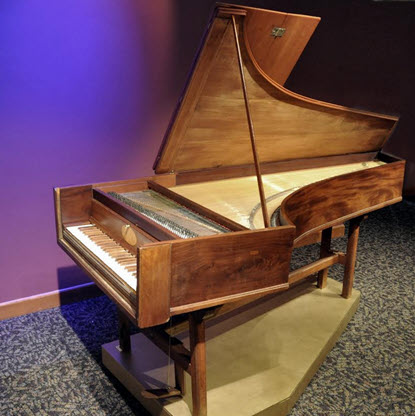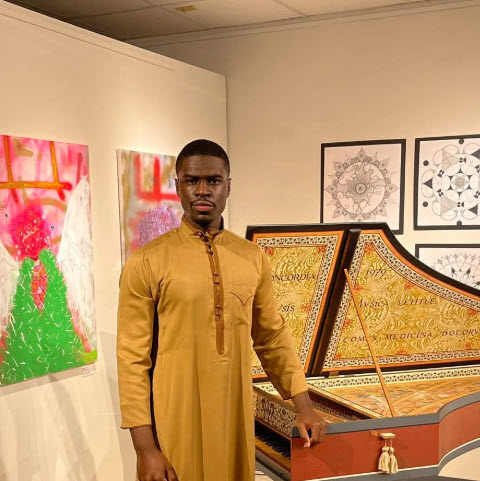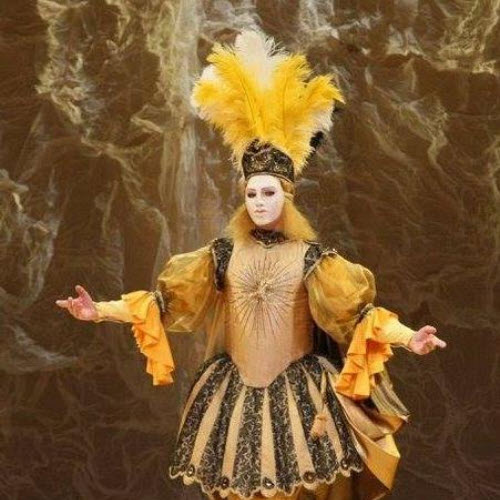by Gail O’Neill
Published January 30, 2023
The Sphinx Performance Academy, in partnerships with the Juilliard School, Cleveland Institute of Music (CIM) and the University of Colorado-Boulder’s College of Music, introduces students to period instruments and historical performance in a series of intensive, two-week summer camps.
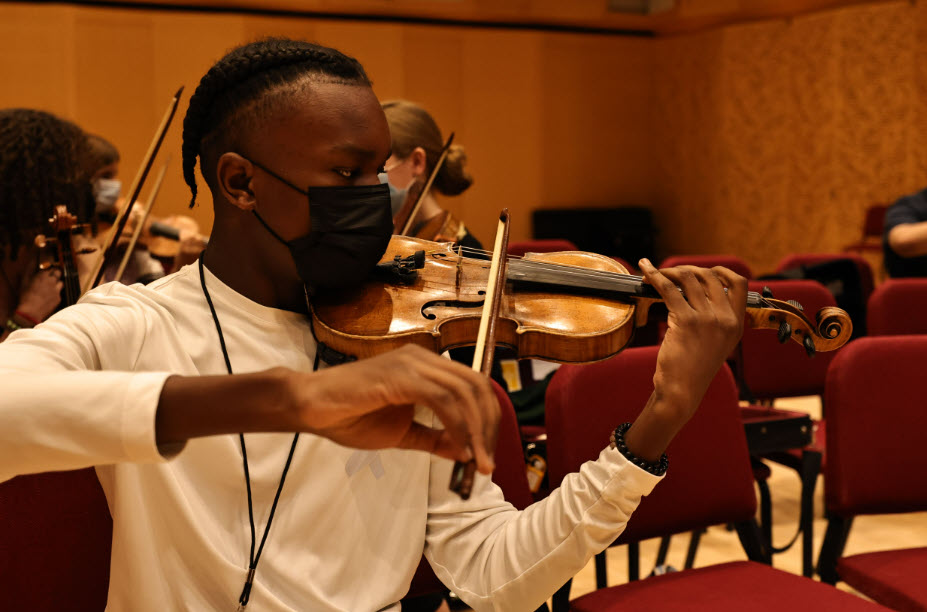
The Sphinx Organization, launched in 1997, has built a strong reputation for identifying and empowering young Black and Latine string players and nurturing them for professional careers in classical music. Sphinx’s ambition for its graduates has long been aimed toward concert soloists or preparing them for a spot in the symphonic world, with its wildly competitive audition process and, at the best orchestras, a stable rooster of tenured, well-compensated musicians.
Twenty-five years after its founding, the year-round, tuition-free, creative youth development Sphinx Organization, based in Detroit, has become a major catalyst for change on the arts and culture landscape.
Now Sphinx is expanding its repertoire and its students’ musical options.
The Sphinx Performance Academy (SPA), in partnerships with the Juilliard School, Cleveland Institute of Music (CIM) and the University of Colorado-Boulder’s College of Music, introduces students, aged 11-17, to period instruments and historical performance in a series of intensive, two-week summer camps.
Applications for the SPA are open to students nationwide, and the deadline for this summer’s programs is February 12, 2023.
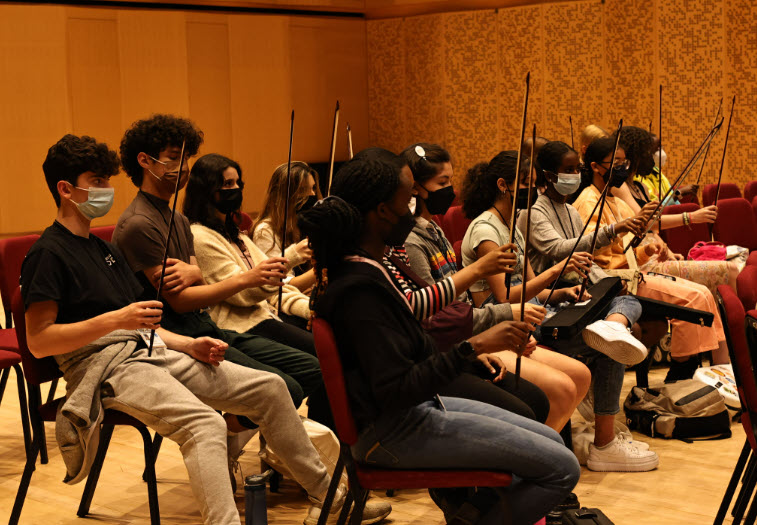
“Sphinx’s partnership with these historical performance programs at the collegiate level is such a brilliant collaboration,” says David McCormick, executive director of Early Music America. “Putting historical string instruments in the hands of any middle or high school student would be cause for celebration. But giving Black and Latino students access to the idiom is especially exciting because we’re trying to have a more inclusive field.” To that end, all Sphinx students, past and present, can receive a free EMA membership, and EMA has earmarked scholarships for SPA alums to attend summer festivals or workshops with an exclusive focus on early music.
‘Things that engage the brain slightly differently’
In the classical music world, the Sphinx origin story has become almost legend. Decades before the ideals of diversity, equity, and inclusion (DEI) entered the popular lexicon, an emerging artist named Aaron P. Dworkin envisioned a world where classical musicians and audiences reflected the wider community. Often the only person of color in classical music settings, Dworkin, who is biracial, had firsthand experience with people who harbored negative presumptions about his artistry based solely on his race.
Simultaneously, he withstood the headwind of feeling isolated while striving to find his voice as a violinist, absent any role models whose life experiences mirrored his own. “He didn’t want a new Juilliard,” says Dworkin’s wife, Afa S. Dworkin. “He wanted Juilliard to look like New York.”
Today, the Sphinx Organization employs 10 full-time staff members and over 50 teaching artists and seasonal teams. To date, Sphinx boasts an alumni roster of more than 1,000 artists and leaders, a digital imprint of 60 million people, and over $10 million invested in artist grants and scholarships. (Afa assumed the roles of Sphinx artistic director and president when Aaron became the dean of the School of Music, Theater, and Dance at the University of Michigan in 2015.)
Sphinx has made its mark in the modern string world, which can seem hyper-competitive, with an outsized emphasis on how fast, in tune, and accurately musicians play. The early-music world (to oversimplify the differences) values the same markers of proficiency but never at the expense of cultivating musicianship, historical study, and the practice of slowing down enough to fully explore the composer’s sound world—which often tends to be dance- or text-oriented.
Something as simple as letting a young string player experiment with a baroque bow compels them to approach their instrument, and their involvement with music, from a fresh perspective.
It’s a logic central to the historically informed movement but one that often comes as a revelation when introduced to a student. Grand pianos and modern violins (and its “Torte”-style bow), for example, evolved alongside the Romantic and modern repertoire and make it relatively easy to play out and play loud. But those same instruments, set up for power, volume and a smooth tone, must approach Baroque and Classical-era music with a measure of restraint. On a period instrument such as a fortepiano or baroque cello, the musician must push to get the sound out, and thus the performance takes on a different character. And it’s easier and more natural to play Bach with a baroque violin bow, which is shorter, lighter, and ideally balanced for dance rhythms.
Just as essential, students are required to take a scholarly approach to understanding the art form.
“We are asking them to think about how the music was written, for whom, where it was written, and the context of its writing,” says Karin Brookes, administrative director of Juilliard’s Historical Performance program. “Historical performance requires a focus on technique plus the things that engages the brain slightly differently. It encourages a slightly different attitude to the way you perform the music than when you’re performing with modern technique.”
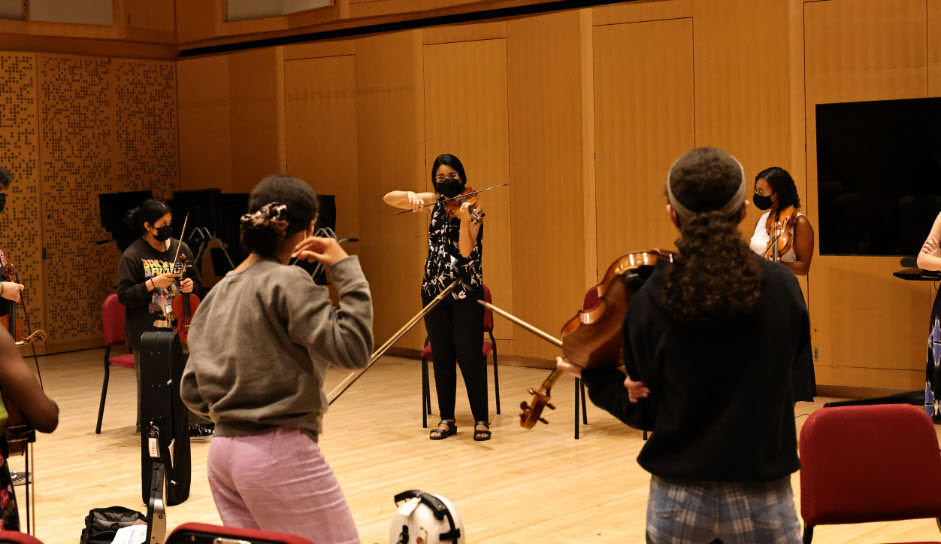
In the summer of 2022, Juilliard hosted 28 students. Now that CIM and the University of Colorado have pledged their support for 2023, some 85 to 90 Sphinx pupils will be served this coming summer. The skillsets they’ll acquire, from patience and discipline to mindfulness and proper body movement, will serve them well as they seek mastery on the violin, viola, cello, or double bass. But even if pupils don’t pursue careers as a soloists, orchestral, or chamber musicians, the lessons learned will serve them in every arena of their lives going forward. Moreover, exposure to early music can illuminate potential career paths that might otherwise elude children from under-served communities—whether it’s becoming a luthier, an arts administrator, or an entrepreneur who manages professional musicians, among many options.
‘Blooming to their full potential’
Ana Abrantes has firsthand knowledge of how a music education can change a life. As Sphinx’s director of education, she oversees the SPA as well as the organization’s Overture Program, serving elementary school students throughout Detroit and Flint. Every time she introduces a child to an instrument it feels like a full-circle moment.
“I was a 12-year-old going to public school in southeast Brazil when an organization decided to create an after-school program to keep students off the streets and they put a cello in my hands,” Abrantes remembers.
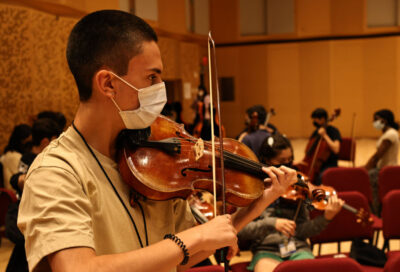
Today, she continues, “when I enter a classroom and tell the students in the Overture Program they will each receive an instrument to keep and watch them pluck the stings for the first time, they hear the sound that is not digital, and they want to learn how to make other notes and use the bow—every single lesson is a moment of discovery for them, and for me.”
The sound is so captivating that parents have thanked Abrantes, saying the violin was the only thing that could divert their child’s attention from video games and mobile devices.
When Dworkin founded Sphinx, he looked forward to a time when the project would be obsolete as the scales of justice were balanced and equal opportunities existed for all children. Now that DEI is a hot topic, Sphinx’s mission aligns perfectly with those of many corporate boards, philanthropic organizations, and arts patrons. But the biggest challenge remains funding as the fear of a recession and economic uncertainty looms.
According to Gustavo Antoniacomi, a master’s candidate at Juilliard who volunteered to mentor and instruct Sphinx students last summer, the institutionalized aspect of intensive learning can be a double-edged sword. Between all the courses, master classes, guest lectures, and rehearsals that comprise a child’s day, the risk of burnout is prevalent. One giveaway is the “saturated look” that Antoniacomi has seen on the faces of his mentees.
“I wish we could find a way to make the entire process a little more organic, and a little bit more human,” says Antoniacomi, the beneficiary of a social project, also in Brazil, where volunteers taught him to play the cello as a child. “Music is something that should grow out of very personal and genuine motivations. In order for us to find those motivations, we may have to give kids a little more mental and physical space…create opportunities for then to get their heads out of the rehearsal and practice mindset so that when we do make music it’s a lot more meaningful.”
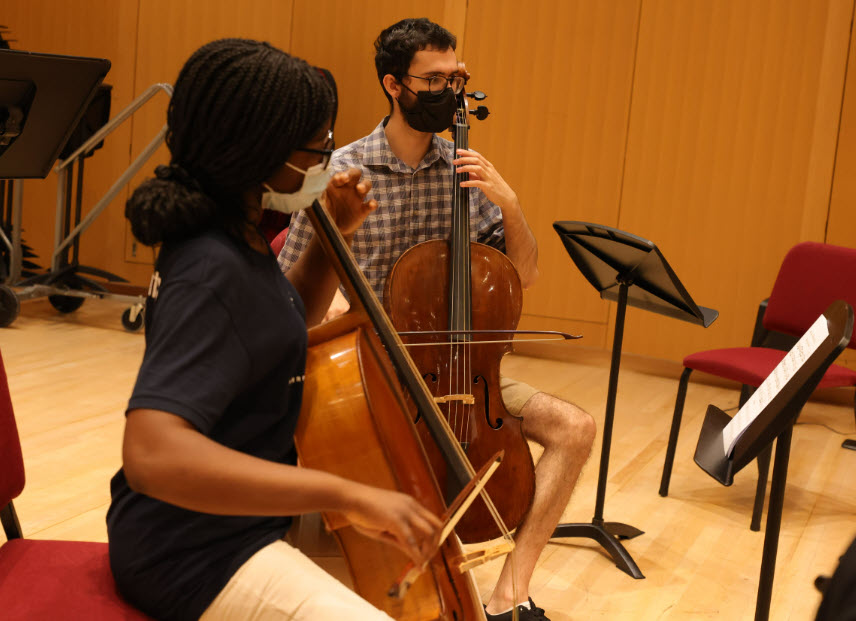
Antoniacomi lives for the moments when he sees a child’s “eyes shining and their brains spinning,” when they are introduced to a new vocabulary and find their voices within the paradigm of early music. He says that he is changed for the better when bearing witness to a child “blooming into their full potential” thanks to an idea, a concept, or simple instruction that he’s imparted.
As Peter Bennett, who heads the Harpsichord Department at CIM, looks forward to welcoming the inaugural class of Sphinx scholars this summer, his experience as an educator and musician has taught him that he stands as much to gain as anyone whenever thin, curated slices of Eurocentric traditions are questioned.
“Even the most well-intentioned of us still don’t quite appreciate how restricted our picture of classical music of the past is until we are faced with it, vis-à-vis students and colleagues whose experiences differ from our own,” says Bennett. “It never occurred to me how much my perspective was limited until a Black student asked that we study the Chevalier de Saint Georges and a female student asked to study Francesca Caccini’s compositions as opposed to Monteverdi’s scores. I thought I was telling the story, but it turns out that I’ve been telling the story that kind of suits me. Thanks to being put on the spot, though, not only was I challenged to see things from a different perspective. I was transformed.”
Gail O’Neill is an Atlanta-based writer and producer. She is an ArtsATL.org editor-at-large, and hosts and co-produces Collective Knowledge, a conversational series that’s broadcast on THEA Network, and frequently moderates author talks for the Atlanta History Center.

